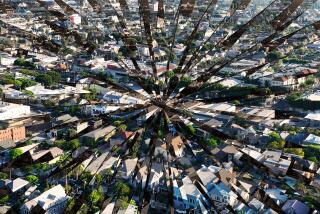Egyptians See God’s Anger in Earthquake
- Share via
CAIRO — For many ordinary Egyptians, experts who explain the recent earthquake with Richter scales and shifts in continental land masses are missing the point.
Many in this devoutly religious country, bewildered by Egypt’s first earthquake in living memory and a series of aftershocks, interpret it as a sign of God’s anger or that the natural order has been disturbed.
“(The earthquake) came from God,” tourist guide Farid Mustafa Abdel-Aaal said. “Everyone is thinking about money and this was from God so that we think about Him.”
Others, like a Muslim fundamentalist preacher who went into the streets to harangue his dazed fellow citizens about sin and corruption a few minutes after the quake, blamed others, notably the government, for not being more Islamic.
Street kiosk owners selling cassettes say sales of popular music have plummeted since the earthquakes, while recordings of the Koran have soared.
“I was talking to a friend from (the Nile Delta town of) Damanhour and they didn’t even feel the earthquake, and you know why?” taxi driver Karim al-Metawalli asked his passenger. “Because they love each other there . . . not like in this jungle,” he said of Cairo, a sprawling city of 12 million people.
“I swear by God, you are right,” his middle-aged woman passenger replied. “We have lost our old morals.”
The quake struck in the afternoon rush hour, killing at least 552 people. Thousands, mainly destitutes, were made homeless.
Skyscrapers and hotels in downtown Cairo swayed spectacularly but were left largely untouched by the quake, which hit the poorly-built tenement housing of Cairo’s slums.
The orthodox Muslim authorities raced to cope with the tremor’s aftermath, checking buildings and finding housing for quake refugees.
Depite the effort, folk superstitions thrive among the millions of poor, uneducated Cairenes packed into shantytowns and struggling to cope with overcrowding, scant job prospects and a fast-changing world with little security at the best of times.
Drivers ward off the “Evil Eye” by painting little blue eyes on their cars. Walls are daubed with hand-prints to keep away bad luck, and newspapers carry lengthy treatments by respected religious scholars on good and evil demons.
“The simple Egyptian who has been used to stability for thousands of years feels an anger and fear . . . he has been suddenly exposed to rapid changes,” wrote Mohammed Tayyib, a professor of psychology, in the Al-Akhbar daily.
“The earthquake increased his confusion and put him in a continuous dialogue with himself and with others.”
But the Egyptian people’s famed sense of humor, one of their main qualities, did not entirely forsake them amid the death and destruction brought by the quake.
“We danced like a disco,” grinned a man when asked how he felt about the quake, which badly damaged his arm when part of his house collapsed.
“May God earthquake you,” quipped an old man trying to cross a street at a motorist who nearly ran him down.
And after accusations that thousands of homes collapsed because landlords and architects cheated on the specifications, a newspaper columnist seized the chance to strike a double blow.
“The earthquake revealed a strange custom among us, which is that we make bread out of cement and build buildings with the finest flour,” he wrote in Al-Akhbar.
More to Read
Sign up for Essential California
The most important California stories and recommendations in your inbox every morning.
You may occasionally receive promotional content from the Los Angeles Times.













